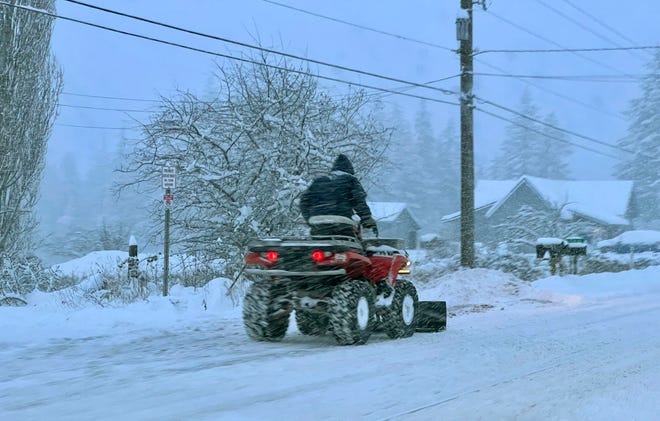
At least 1,000 schools across 35 states have closed for in-person learning because of COVID-19 since the beginning of the school year, according to Burbio, a New York-based data service that is tracking K-12 school reopening trends.
Schools listed in the company's tracker have closed for anywhere from one day to several weeks. Most temporarily moved to remote learning. Others temporarily closed with no instruction. And a small number delayed the start of school or shifted into hybrid learning, according to Burbio.
The rising number of closures comes amid a battle over mask mandates in schools and a surge in pediatric COVID-19 cases largely because of the highly contagious delta variant.
Late last month, President Joe Biden's administration announced it is investigating five states that are banning districts from mandating masks, on the grounds that such policies violate the civil rights of children with disabilities and underlying health conditions.
"The department will fight to protect every student’s right to access in-person learning safely and the rights of local educators to put in place policies that allow all students to return to the classroom full-time in-person safely this fall," Education Secretary Miguel Cardona said in a statement.
Also in the news:
► New Zealand reported its first COVID death in over six months on Saturday – a woman in her 90s who had underlying health conditions, according to authorities. New Zealand remains in lockdown that began last month after one positive case.
► A German man attacked health care workers at a vaccination site after he demanded a vaccination certificate without receiving a shot, and they refused to give it to him. Police said he became violent and injured two workers, who were treated in a hospital and later released.
► Michigan schools this year are still required to display information about reported COVID-19 cases publicly on their websites, under an order from the state health department last October. But some of those dashboards are hard to find or navigate.
📈 Today's numbers: The U.S. has recorded more than 39.9 million confirmed COVID-19 cases and more than 648,100 deaths, according to Johns Hopkins University data. Global totals: More than 220.4 million cases and 4.5 million deaths. More than 175.8 million Americans – 52% of the population – have been fully vaccinated, according to the CDC.
📘 What we're reading: Pediatric ICUs are under stress as more kids are getting hospitalized for COVID-19, RSV or both at the same time. Read more here.
Keep refreshing this page for the latest news. Want more? Sign up for USA TODAY's Coronavirus Watch newsletter to receive updates directly to your inbox and join our Facebook group.
The White House is preparing for future pandemics
The Biden administration unveiled a plan Friday to upgrade the country's ability to respond to biological threats, comparing its scope to the Apollo Program, which was initiated to put a man on the moon.
"We need better capabilities because there's a reasonable likelihood that another serious pandemic that could be worse than COVID-19 will occur soon and possibly even within the next decade," said Eric Lander, director of the White House Office of Science and Technology Policy.
The cost? $65.3 billion over the next decade. A good chunk of that money will go toward vaccine development and distribution, the White House said. Administration officials are hoping an initial $15 billion will pass through Congress as part of the massive $3.5 trillion spending package on the table for this fall.
The plan includes:
- Dramatically expanding the arsenal of vaccines, therapeutics and diagnostics.
- Strengthening public health systems both in the U.S. and internationally.
- Improving the ability of the U.S. to produce personal protective equipment and other vital supplies.
- Improving early detection of pandemic threats.
- Creating a centralized “mission control” to be in charge of an effort that will draw on multiple federal agencies.
Hawaii struggles with delta surge, begs travelers to stay away
Hawaii has already reported more than twice as many coronavirus cases this year as it did in all of 2020, Johns Hopkins University data show.
The data show Hawaii had been reporting 66,778 COVID-19 cases through Saturday afternoon. It had reported 22,007 cases in all of 2020.
The annual comparisons don't begin to tell how much Hawaii struggled with a wave of cases pushed by the delta variant. In just the last month, Hawaii has reported more cases than it did in all of last year.
Hawaii's governor has begged tourists to stay away from the islands through October.
– Mike Stucka
'I'm conflicted':Travelers weigh Hawaii plans after governor begs tourists not to come amid COVID-19 surge
Kentucky health care workers sue over COVID-19 vaccine mandate
Claiming mandatory COVID-19 vaccines are "a fraud upon the entire American public," 40 employees of St. Elizabeth Healthcare have filed a federal lawsuit challenging a requirement they be vaccinated.
The 93-page lawsuit filed Friday in U.S. District Court in Covington, comes amid a surge in COVID-19 cases – largely among unvaccinated patients – that threatens to overwhelm most Kentucky hospitals. Fueled by the delta variant, COVID-19 continues to affect Kentuckians in record numbers.
The lawsuit follows an announcement Aug. 5 by most of the state's major hospital systems, including St. Elizabeth's, based in Northern Kentucky, that they would require vaccines for all workers without a medical or religious exemption to try control the surge of COVID-19 in Kentucky.
– Deborah Yetter, Louisville Courier Journal
Denmark bans unvaccinated US tourists
Denmark is banning unvaccinated tourists from the United States, joining a growing list of European Union member states that are tightening travel restrictions as COVID-19 cases rise.
The change comes after the country moved the U.S. to its "orange" travel advisory category on Saturday. Previously, U.S. tourists could enter Denmark by showing a negative test or proof of recovery. Entry requirements do not change for fully vaccinated U.S. travelers, who are still exempt from testing and quarantine requirements.
The Netherlands, another EU member state, on Saturday started enforcing a quarantine period for vaccinated U.S. travelers and prohibited entry among unvaccinated travelers. Bulgaria announced it would prohibit travel from the U.S. and Italy added testing and self-isolation requirements for U.S. travelers. Read more here.
– Bailey Schulz
What we know about the mu variant
The mu variant has been marked as a "variant of interest" by the World Health Organization and has spread across Chile, Peru and parts of the U.S. and Europe.
The mu variant is the fifth variant of interest currently being monitored by the organization. Stuart Ray, a professor of medicine at John Hopkins University, said the variant accounts for most cases in Colombian, Chile and Peru, but only some cases in the U.S. as of right now.
As of now, Ray said what’s concerning is mu obtains similarities to deadlier variants such as the delta variant, which is the cause of over 99% of cases in the U.S. Read more here.
– Gabriela Miranda
Contributing: The Associated Pres
Source link










